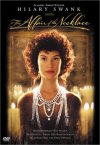BUY THE DVD:
|


|
|
|
SYNOPSIS:
| |
the world's most dangerous spy is hired by the cia to coerce a computer hacker recently released from prison to help steal billions in unused government funds.
|
|
|
MOVIE FACT:
| |
this movie sat on 4 different release dates before settling in november of 2001. |
|
|
RATING:
|



three out of four possible stars
|
|
|
|
Fascinating subject, interesting presentation, and a historical film with enough modern sensibility to entertain today's audiences, The Affair of the Necklace is almost what one could term a "quirky" movie, in that it has a sense of humor about it, even though it takes place during the horrors of the French Revolution. And although everyone in the film sports and English accent, rather than some French dialogue, this aspect of the film doesn't seem to matter because of the attention paid to the realism of the costumes and locations for the characters.
Those characters and their relationships to one another are nothing if not entertaining. And this film is not so much a historical study of Revolutionary France as it is a piece of cinematic entertainment. There is a wry humor present in much of the film that allows it to float along very nicely for much of its running time, even if sometimes it does not delve deep enough into the drama of the era. Some of the tension that should have been present during the time of Madame Guillotine was definitely missing, and the actors should be congratulated for not letting this small failing get in their way.
In point of fact, the cast assembled for this film is probably the best thing about it, next to the talented dressings of the costume makers. Although the film is supposed to have been based on true events, what actually happened over two hundred years ago doesn't really matter in the long run. This is more a character study than a history lesson. And so because the film doesn't make telling an accurate history its primary mission, it's able to focus more on character and the lighter elements of the movie, such as the location scouting.
Although it is probable that the Czech Republic was used by the filmmakers and stood in for most of 18th century France, those locations used, along with the fine attention to detail taken by the costumer make sure that viewers of the film really see quite an incredible display on screen. And because the filmmakers didn't seem so bent on relating the facts exactly how they happened, something very interesting happens. Because the characters are so interesting and accessible, the story, whether it was taken exactly from true events or not, is easily conveyed over the course of about one-hundred minutes.
It shouldn't be overlooked that the fine character development over the movie is made possible by a well cast group of actors. As "Jeanne St. Remy de Valois," Hilary Swank, as the top billed star, gives an emotional and believable performance as part of the legal fiasco that helped fuel the flames of the French Revolution. She is able to convey being both an unsure newcomer to the decadent world of the French Court, but also a strong woman in pursuit of her goals. She plays a displaced member of the Valois House, whose parents were killed because of her father's loyalty to peasant causes in the 1760's.
It is her goal throughout the film to reclaim the good standing of her family name and she becomes embroiled in a complicated scheme involving a one-hundred caret diamond necklace and several high-ranking members of the French royalty and its cousins. Playing her lover throughout the film, Simon Baker plays "Rétaux de Vilette," a man used to using the elderly widows of the Court to make his way through society, but soon falls in love with both Jeanne's devious plan and the woman herself. And Adrien Brody plays the surprising role of "Nicolas De La Motte," Jeanne's husband.
One would expect the role of Comte De La Motte to belong to an old man (the production early on leads the audience to believe this), but in casting a young man to play the character, the director created an interesting triangle between Jeanne, her husband, and her lover. And these three actors all play their parts very well, and are joined by quite an impressive cast. Playing the famous Marie-Antoinette, Joely Richardson gives what can only be considered a sympathetic performance of the much maligned Queen, allowing for a very different take on a woman who is seemingly a reviled part of French history.
Richardson is joined by the always fabulous Christopher Walkin playing a mysterious Italian magician, and Jonathan Pryce, as the very conflicted and unfaithful Cardinal Louis de Rohan. These additions to the cast all round out what for casual viewers of dramatic epics will consider an entertaining time at the movies. And members of the audience looking for staid, historical representations of what life was actually like two-hundred years ago might be pleasantly surprised that this movie is actually somewhat more than just a good time at the movies.
Review by Kelsey Wyatt.
| |
|